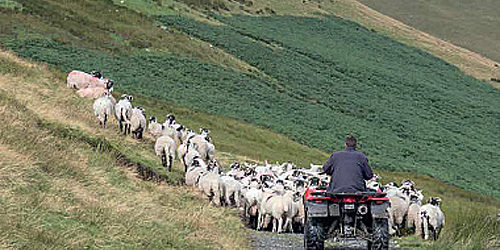
There is a generational crisis in farming. According to Defra the percentage of farmers under the age of 45 had fallen to just 13% in 2015, down from 18% in 2003. At the same time, we know from our young farmers that they are more than willing to put in the hard yards needed to secure the future of farming in the UK. Millennial farmers bring fresh eyes, new ideas and ambition for the sector, but they need help to make their goals a reality. We have time to turn this situation around and to ensure a positive future for the rural economy. However, if we are to do so, we first need to properly understand the situation and then actively address every issue.
NatWest’s recent report, “Harvesting the Future for Young Farmers”, is based on a landmark study of over 500 young and potential new entrant farmers in Britain, combined with insights and an economic analysis of the future for the industry. For the first time, at a practical and policy level it enables us to understand the economic and the human challenges and opportunities facing Britain’s young farmers while informing the road map of policy asks we set out for the future. This is particularly important given the changes that Brexit might bring about, although for many young farmers Brexit was just another of the many and varied challenges they had to manage.
There is no silver bullet, nor any one authority, that has the power to solve the issues at hand while unlocking the full potential of this community. However, aspirant young farmers have identified a number of key areas whereby real change could be achieved.
That is why we are calling for enhanced recognition of the agricultural economy within Government through a new Cabinet Committee, one that is expressly supported by an inclusive Better Brexit Farming Strategy Taskforce. Serious obstacles also remain for young farmers in terms of barriers to entry, and in the report, we outline a number of actions that could be taken now, starting with a Succession Summit.
Access to funding and enhanced business skills also need more forensic attention and we suggest a number of actions ranging from loan guarantee schemes, off the shelf diversification funding products, through to the inclusion of business planning in farming apprenticeships, to kick-start this process.
The report is not going to deliver a seismic shift in Britain’s global economic performance, nor is it intended to do so. That is not to diminish the sector’s contribution - farming remains a critical sector to the British economy, generating around £23.4bn of revenue, employing almost half a million people and managing a vast swathe of our invaluable natural resources.
However, the issues we need to address are found most tellingly at the front line, at a local, personal level, where what appear to be small, incremental improvements can be transformative in enabling a farmer to sustain or grow their business.
Three big themes from the research which are explored in greater detail in the report – barriers to entry; productivity; and funding availability. For the vast majority, farming provides a modest income.
Supplementary income, improvements in productivity, new technologies and diversification all enable the young farmer to improve resilience, with improved adaptability and strategic flexibility. This is particularly important in tough times when global commodity prices fall or input prices rise. Farmers don’t need a strapline such as the squeezed middle, or JAMs (just about managing), to know that they bear the brunt of economically challenging times, or indeed in the good times when deflation, as a result of the transition to more open markets and global economies of scale, drives down the commodity price.
Our research shows that with just a small increase in investment almost 20,000 new development and diversification projects would be undertaken with an average annual return of almost £11,900 in additional income for each of those farms. A number that looks small on a macroscale, but at nearly £1,000 per month, this income could make the difference between a stressful and more comfortable life in normal times, but also income that can sustain a business when the going gets tough.
Despite the benefits of being your own boss and the ongoing technological innovations, farming is not a career for those who are not willing to work hard. It involves long hours, physical and psychological stresses and strains, and, depending on the year, there are certainly easier ways to make money.
Given this, and the decline in young farmers actively farming, it would be easy to conclude that the next generation is not up to the hard graft. This is absolutely not the case. Our research uncovers another side to the millennial era. As one young farmer described it: “I got stuck in, worked hard, took control. I questioned why we did things certain ways and proved how doing it another way would be beneficial.”
Young farmers are a high-tech, highly skilled, highly motivated group of young people who hold a realistic picture of farming in their heads while wanting a career on the land. They are however, seriously constrained in a number of ways and despite more applications to colleges, their numbers are falling. If we are to unlock this potential, then there are a number of actions to be taken and issues to be overcome.
Our aspiration for this report is that it inspires the industry to turn these challenges into opportunities, an action plan that is achievable. As we set out, some require relatively modest improvements and change, whilst others demonstrate the need for joined-up thinking, longer term investments, or represent problems that have increased over time and that for some look intractable. For example, just untangling the complexity of farming succession leads us to uncover issues ranging from family, inheritance and taxation, all the way through to land prices and availability, housing costs and the planning system.
It is incumbent on all of us – banks, government, local government, families and communities – to come together and ensure today’s young farmers are able to harvest their own futures.






